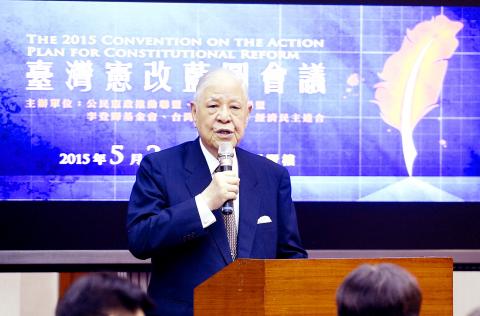Former president Lee Teng-hui (李登輝) yesterday said that there is no such thing as the so-called “1992 consensus” and it “only incurs ridicule” when President Ma Ying-jeou (馬英九) keeps “chanting” it.
The 92-year-old former president attended the 2015 Convention on the Action Plan for Constitutional Reform, co-hosted by several civic groups, including Civil Alliance to Promote Constitutional Reform (CAPCR) and the Lee Teng-hui Foundation, as the “honorary convener” yesterday.
Asked how he views the visit by Chinese Nationalist Party (KMT) Chairman Eric Chu (朱立倫) to Beijing and Chu’s scheduled meeting with Chinese President Xi Jinping (習近平) tomorrow, Lee said Chu went to China “to represent the KMT, [so] it has nothing to do with me nor with Taiwanese; it’s the KMT’s own business.”

Photo: George Tsorng, Taipei Times
“[Chu] is the KMT chairman, and he might want to run for president in the future. As a country’s leader, what is most important is to answer to the needs of Taiwan and Taiwanese,” Lee said. “Don’t follow Mr Ma’s steps in reciting the ‘1992 consensus,’ which he has been unnecessarily repeating for almost 10 years; it’s embarrassing. The attitude of a leader is lacking in his chanting.”
Lee denied that a consensus was reached in 1992 between Taiwan and China, saying Ma’s claim that the “1992 consensus” was the most significant consensus made across the Taiwan Strait was “simply talking nonsense.”
“There is no such consensus,” Lee said, adding that he had asked then-Straits Exchange Foundation (SEF) legal bureau head Shi Hwei-yow (許惠祐), then-SEF deputy secretary-general Chen Rong-jye (陳榮傑) and then-SEF chairman Koo Chen-fu (辜振甫) — who were the delegates to the cross-strait meeting in 1992 — about the meeting and was told there had been no such consensus.
“Why chant something that does not exist? Apparently it is in order to sing the same tune with China,” Lee said. “Taiwan is Taiwan; China is China; the idea of ‘one China’ is an ancient concept. The whole world is talking about ‘one China,’ but Taiwan, as a free, democratic society, should not handle the issue like this.”
Lee called the consensus “something that former Mainland Affairs Council minister Su Chi (蘇起) fabricated to placate the KMT in 2000.”
The “1992 consensus” refers to a supposed understanding reached during the cross-strait talks in 1992 that both Taiwan and China acknowledge that there is “one China,” with each side having its own interpretation of what that means.
In 2006, Su admitted he made up the term “1992 consensus” in 2000, before the KMT handed power to the Democratic Progressive Party.

ACTION PLAN: Taiwan would expand procurement from the US and encourage more companies to invest in the US to deepen bilateral cooperation, Lai said The government would not impose reciprocal tariffs in retaliation against US levies, President William Lai (賴清德) said yesterday, as he announced five strategies to address the issue, including pledging to increase Taiwanese companies’ investments in the US. Lai has in the past few days met with administrative and national security officials, as well as representatives from various industries, to explore countermeasures after US President Donald Trump on Wednesday last week announced a 32 percent duty on Taiwanese imports. In a video released yesterday evening, Lai said that Taiwan would not retaliate against the US with higher tariffs and Taiwanese companies’ commitments to

Intelligence agents have recorded 510,000 instances of “controversial information” being spread online by the Chinese Communist Party (CCP) so far this year, the National Security Bureau (NSB) said in a report yesterday, as it warned of artificial intelligence (AI) being employed to generate destabilizing misinformation. The bureau submitted a written report to the Legislative Yuan in preparation for National Security Bureau Director-General Tsai Ming-yen’s (蔡明彥) appearance before the Foreign Affairs and National Defense Committee today. The CCP has been using cognitive warfare to divide Taiwanese society by commenting on controversial issues such as Taiwan Semiconductor Manufacturing Co’s (TSMC, 台積電) investments in the

HELPING HAND: The steering committee of the National Stabilization Fund is expected to hold a meeting to discuss how and when to utilize the fund to help buffer the sell-off The TAIEX plunged 2,065.87 points, or 9.7 percent, to close at 19,232.35 yesterday, the highest single-day percentage loss on record, as investors braced for US President Donald Trump’s tariffs after an extended holiday weekend. Amid the pessimistic atmosphere, 945 listed companies led by large-cap stocks — including Taiwan Semiconductor Manufacturing Co (TSMC, 台積電), Hon Hai Precision Industry Co (鴻海精密) and Largan Precision Co (大立光) — fell by the daily maximum of 10 percent at the close, Taiwan Stock Exchange data showed. The number of listed companies ending limit-down set a new record, the exchange said. The TAIEX plunged by daily maxiumu in just

‘COMPREHENSIVE PLAN’: Lin Chia-lung said that the government was ready to talk about a variety of issues, including investment in and purchases from the US The National Stabilization Fund (NSF) yesterday announced that it would step in to staunch stock market losses for the ninth time in the nation’s history. An NSF board meeting, originally scheduled for Monday next week, was moved to yesterday after stocks plummeted in the wake of US President Donald Trump’s announcement of 32 percent tariffs on Taiwan on Wednesday last week. Board members voted to support the stock market with the NT$500 billion (US$15.15 billion) fund, with injections of funds to begin as soon as today. The NSF in 2000 injected NT$120 billion to stabilize stocks, the most ever. The lowest amount it